Kennedy's Last Days: The Assassination That Defined a Generation (23 page)
Read Kennedy's Last Days: The Assassination That Defined a Generation Online
Authors: Bill O'Reilly

Caroline Kennedy grins at White House photographer Cecil Stoughton. Secret Service agent Robert Foster sits next to her.
[JFK Presidential Library and Museum]
At 11:00
A.M.
, the president gave John Jr. one last hug and stepped onto the tarmac before climbing the steps up into
Air Force One
. The first lady was at his side. Five minutes later, the plane went wheels-up for the three-and-a-half-hour flight to Texas. John Kennedy Jr. watched the great jet rise into the sky and disappear into the distance.
President John F. Kennedy pored over the “Eyes Only, President” intelligence documents overflowing from his battered black briefcase.
Air Force One
will land first in San Antonio. Then on to Houston and then Fort Worth, where the president and first lady will spend the night. Dallas will come tomorrow. JFK’s personal pilot, Colonel Jim Swindal, will take the Kennedys from Fort Worth into Dallas’s Love Field. The flight will be short, just 13 minutes. But the symbolic image of
Air Force One
descending from the heavens to land in that troubled city will be a far more powerful sight than John Kennedy driving 35 miles across the prairie in a limousine.
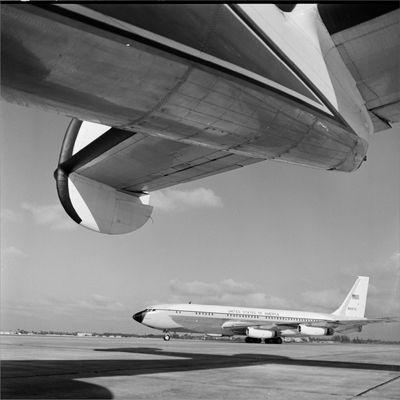
Air Force One
, a specially fitted Boeing 707, was called the flying White House.
[JFK Presidential Library and Museum]
JFK gets up and makes his way back to the first family’s quarters. He taps lightly on the door and pokes his head in. “You all right?” he asks Jackie. They will be landing soon. “Fine,” the first lady responds.
“I just wanted to be sure,” he tells her, closing the door.
The president feels a slight dip as
Air Force One
begins to descend. He looks out the window. Five miles below and slowly rising up to greet him is the barren and flat landscape of Texas.
* * *
On the ground in Dallas, Lee Harvey Oswald stuffs cardboard shipping boxes with books as he fills orders at the Texas School Book Depository. But today he is easily distracted. A map of the motorcade route was printed on the front page of the
Dallas Times Herald
’s afternoon edition and caught his attention.
Air Force One
will land at Love Field, and from there, the president will travel to the Trade Mart to give a speech. On the way, he will pass the Texas School Book Depository.

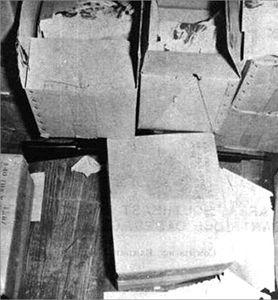
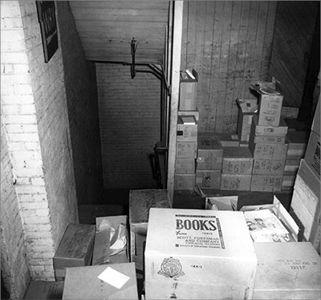
Several views of the sixth floor taken on November 22, 1963.
[NARA/JFK Assassination Records]
Oswald looks out the nearest window and sees precisely where President Kennedy’s limousine will make a slow right turn from Main Street onto Houston, then an even slower left-hand turn onto Elm, where it will pass almost directly below the windows of the depository. Getting a good glimpse of the president will be as simple as looking down onto the street below.
But Lee Harvey Oswald is planning to do much more than catch a glimpse. In fact, he is quietly plotting to shoot the president. Oswald does not hate the president. He has no reason to want JFK dead. He is, however, bitter that a man such as John Kennedy has so many advantages in life. Oswald well understands that it’s easier for men born into privilege to distinguish themselves. But other than that small amount of envy, he does not speak unfavorably about the president. In fact, Oswald wants to be like JFK.
Above all, he wants to be a great man.
* * *
“Can I ride home with you this afternoon?” Oswald casually asks Wesley Frazier. His 19-year-old coworker’s home is in the suburb of Irving, a half block from where Marina Oswald lives with Ruth Paine. Oswald often catches a ride out there on Fridays.
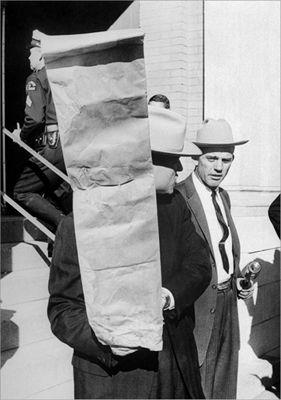
Investigators carry the container made of paper that Oswald used to hide his rifle. It was found on the sixth floor of the Texas School Book Depository building after the assassination.
[© Bettmann/Corbis]
But then Frazier realizes that today isn’t Friday. It’s Thursday—and Oswald never rides to Irving on Thursdays. “Why are you going home today?” Frazier asks him.
“I am going home to get some curtain rods,” Oswald replies.
Oswald then steals a length of brown wrapping paper from the depository’s shipping department. He spends the rest of his workday making a bag in which to conceal his rifle.
CHAPTER THIRTY-TWO
NOVEMBER 22, 1963
Fort Worth, Texas 7:30
A.M.
“
I
T
’
S RAINING,
”
SAYS
G
EORGE
T
HOMAS,
stepping inside John Kennedy’s Fort Worth hotel suite. The president’s valet wakes him up at 7:30
A.M
. A crowd is already gathering in the parking lot eight floors below, waiting to hear Kennedy speak to them from the back of a flatbed truck. The audience of nearly 5,000 is mostly male union workers. Many have been standing in the rain for hours.
“That’s too bad,” Kennedy replies to his valet. Rain means that the bubble-top roof will be buckled onto his limousine for the Dallas motorcade. Not only will the local citizens be upset by having to wait in the cold and rain for hours until he passes by, but their inability to get a clear glimpse of the president and first lady inside the bubble will do little to secure their votes next November.
The president wraps himself in his back brace, tightly adjusting the straps. He then dresses in a blue suit, a dark blue tie, and a white shirt with gray stripes. He reads the CIA situation reports and scans several newspapers. The
Chicago Sun-Times
is reporting that Jackie just might be the pivotal factor in helping him get reelected in 1964. That’s the best news of this trip so far: Everyone loves the first lady. The people of Texas screamed and cheered for JFK on the first day of the Texas trip. But as big as his ovations are, and as intently as the audiences hang on every word of his speeches, the receptions John Kennedy receives are nothing like what his wife is experiencing. Jackie is the talk of Texas, and bringing her along may just be the smartest political move the president has ever made.
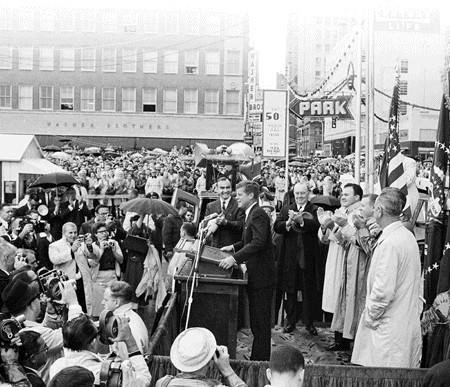
Kennedy speaks to the crowd from a decorated truck flatbed outside his hotel.
[JFK Presidential Library and Museum]
By 9:00
A.M.
, John Kennedy is standing on the back of the flatbed truck, looking upbeat and triumphant. “There are no faint hearts in Forth Worth,” he says approvingly to the crowd. He has a well-deserved reputation for not giving in to the elements. The union workers knew their waiting in the rain would be rewarded and that the speech would not be canceled.
“Where’s Jackie?” someone shouts.
“Where’s Jackie?” yells another voice.
John Kennedy smiles and points up to her hotel room. “Mrs. Kennedy is organizing herself,” he jokes. “It takes longer,” the president adds. “But, of course, she looks better than we do when she does it.”
The crowd roars in laughter.
